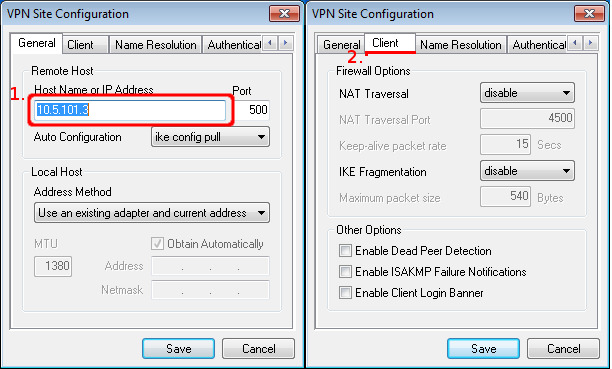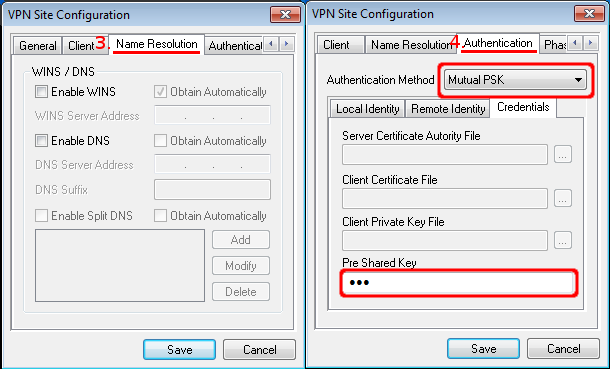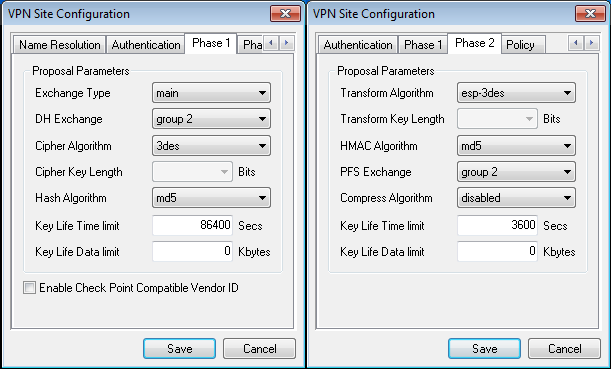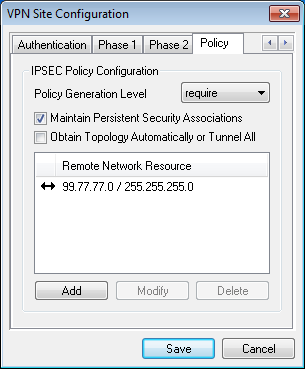IPSEC between Mikrotik router and a Shrew client: Difference between revisions
No edit summary |
this method doe snot work anymore |
||
| (2 intermediate revisions by the same user not shown) | |||
| Line 26: | Line 26: | ||
Now we need to match configuration on Shrew client. And assume that we want to reach remote network 99.77.77.0/24 located behind router from Shew client | Now we need to match configuration on Shrew client. And assume that we want to reach remote network 99.77.77.0/24 located behind router from Shew client | ||
In this particular example we will disable all modeconf related stuff. | |||
* On the first configuration tab ("General") we simply specify server's IP address. | * On the first configuration tab ("General") we simply specify server's IP address. | ||
| Line 150: | Line 150: | ||
[[Category: VPN|IPSec]] | |||
Latest revision as of 12:41, 19 October 2016
Overview
This article shows how to connect Shrew Ipsec client to RouterOS Ipsec server.
Shrew client works on both Windows (without need of L2TP) and Linux, see more details in their website
RouterOS Configuration
Lets assume that we already have IP connectivity between client and server. Client's IP address will be 10.5.101.20 and servers IP address will be 10.5.101.3.
IPSec configuration
/ip ipsec peer add address=10.5.101.20/32 auth-method=pre-shared-key exchange-mode=main\ secret=123 hash-algorithm=md5 enc-algorithm=3des generate-policy=yes
Since we assume that it is Road-Warrior setup, we do not know from where client will be connecting, so generate-policy=yes should be set.
The rest of the configuration is default
Shrew client configuration
Now we need to match configuration on Shrew client. And assume that we want to reach remote network 99.77.77.0/24 located behind router from Shew client
In this particular example we will disable all modeconf related stuff.
- On the first configuration tab ("General") we simply specify server's IP address.
- On the second tab ("Client") disable any features that you do not want to use. In this case we are not using NAT-T, DPD, etc. So all of them are disabled.

- On the third tab ("Name Resolution") we disable everything since these options are used by modecfg, which is not supported on ROS.
- On the fourth tab In our case we are using pre shared key, so choose Mutual PSK and enter pre shared key.

- On "Phase1" and "Phase2" tabs we match configuration to the RouterOS config. Phase1 should match /ip ipsec peer config and Phase 2 should match /ip ipsec proposal config

- And the last one we manually set which network we want to reach so that Ipsec can generate proper policies.

Here is the whole Shew config, you can import it in your client
n:version:2 n:network-ike-port:500 n:network-mtu-size:1380 n:network-natt-port:4500 n:network-natt-rate:15 n:network-frag-size:540 n:network-dpd-enable:0 n:client-banner-enable:0 n:network-notify-enable:0 n:client-wins-used:0 n:client-wins-auto:1 n:client-dns-used:0 n:client-dns-auto:0 n:client-splitdns-used:0 n:client-splitdns-auto:0 n:phase1-dhgroup:2 n:phase1-life-secs:86400 n:phase1-life-kbytes:0 n:vendor-chkpt-enable:0 n:phase2-life-secs:3600 n:phase2-life-kbytes:0 n:policy-nailed:1 n:policy-list-auto:0 s:network-host:10.5.101.3 s:client-auto-mode:pull s:client-iface:direct s:network-natt-mode:disable s:network-frag-mode:disable s:auth-method:mutual-psk s:ident-client-type:address s:ident-server-type:address s:ident-client-data:10.5.101.20 s:ident-server-data:10.5.101.3 b:auth-mutual-psk:MTIz s:phase1-exchange:main s:phase1-cipher:3des s:phase1-hash:md5 s:phase2-transform:esp-3des s:phase2-hmac:md5 s:ipcomp-transform:disabled n:phase2-pfsgroup:2 s:policy-level:require s:policy-list-include:99.77.77.0 / 255.255.255.0
Check Connectivity
[admin@MikroTik] /ip ipsec remote-peers> print 0 local-address=10.5.101.3 remote-address=10.5.101.20 state=established side=responder established=44m3s
- IPSec should show intalled-sa,
[admin@MikroTik] /ip ipsec installed-sa> print
Flags: A - AH, E - ESP, P - pfs
0 E spi=0x476464 src-address=10.5.101.20 dst-address=10.5.101.3
auth-algorithm=md5 enc-algorithm=3des replay=4 state=mature
auth-key="fae8bc2918fea03dac0b7c8b6db57c60"
enc-key="15627d42163ad1fd58ee7cdc80d971d334883dbd2d81c42c"
addtime=sep/27/2012 13:51:07 expires-in=15m32s add-lifetime=48m/1h
current-bytes=240
1 E spi=0x5D4BF3B9 src-address=10.5.101.3 dst-address=10.5.101.20
auth-algorithm=md5 enc-algorithm=3des replay=4 state=mature
auth-key="728b19191d2a111673298c07d1f459c2"
enc-key="c944c45447df5429860d3999e674e1689bb41527ec941c9a"
addtime=sep/27/2012 13:51:07 expires-in=15m32s add-lifetime=48m/1h
current-bytes=240
- And dynamically created policies
[admin@MikroTik] /ip ipsec policy> print
Flags: X - disabled, D - dynamic, I - inactive
1 D src-address=10.5.101.20/32 src-port=any dst-address=99.77.77.0/24
dst-port=any protocol=all action=encrypt level=require ipsec-protocols=esp
tunnel=yes sa-src-address=10.5.101.3 sa-dst-address=10.5.101.20
proposal=default priority=2
2 D src-address=10.5.101.20/32 src-port=any dst-address=99.77.77.0/24
dst-port=any protocol=all action=encrypt level=require ipsec-protocols=esp
tunnel=yes sa-src-address=10.5.101.3 sa-dst-address=10.5.101.20
proposal=default priority=2
3 D src-address=99.77.77.0/24 src-port=any dst-address=10.5.101.20/32
dst-port=any protocol=all action=encrypt level=require ipsec-protocols=esp
tunnel=yes sa-src-address=10.5.101.20 sa-dst-address=10.5.101.3
proposal=default priority=2